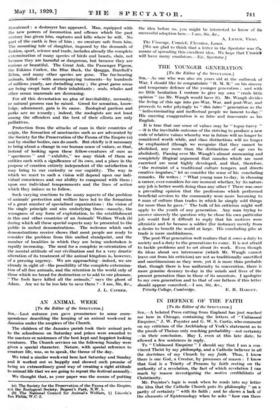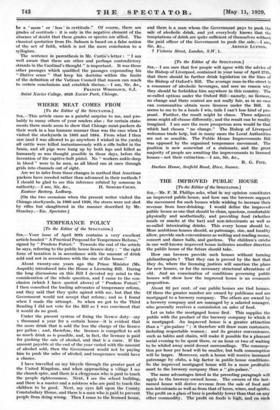IN DEFENCE OF THE FAITH
[To the Editor of the SPECTATOR.] Sts,—A belated Press cutting from England has just reached me here in Chicago, containing the letters of " Unbiassed Enquirer," J. W. Poynter and G. W. S. Curtis, who comment on my criticism of the Archbishop of York's statement as to the proofs of Theism only reaching probability—not certainty —in their conclusion. May I, even at this late date, be allowed a few sentences in reply.
To " Unbiassed Enquirer " I should say that I am a con- vinced Theist by my philosophy, and a Catholic believer in all the doctrines of my Church by my faith. Thus, I know there is one God, a Creator, by processes of reason : I know that God is a Trinity of Persons by faith resting on the authority of a revelation, the fact of which revelation I can reach by reason investigating the 'Roam credibilitails of Christianity.
Mr. Poynter's logic is weak when he reads into my letter the idea that the Catholic Church puts its philosophy " son a parity of certainty " with its faith ; and he shows a lack of the elements of Epistemology when he asks " how can there
be a more or ' less ' in certitude." Of course, there are grades of certitude : it is only in the negative element of the absence of doubt that these grades or species are allied. The classical quotation from Dr. Salmon is based on a false notion of the act of faith, which is not the mere conclusion to a syllogism.
The sentence in parenthesis in Mr. Curtis's letter : " I am well aware that there are other and perhapi contradictory strands in the Cardinal's thought " is important. It was those other passages which qualified the passages expounding his " illative sense " that keep his doctrine within the limits of the definition of the Vatican Council that reason can reach to certain conclusions and establish theism.—I am, Sir, &c., FRANCIS WOODLOCK, S.J. Saint Xavier College, 4928 Xavier Park, Chicago.











































 Previous page
Previous page